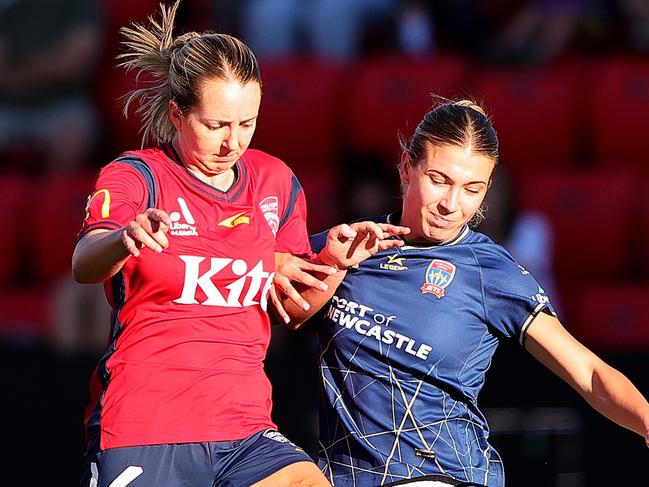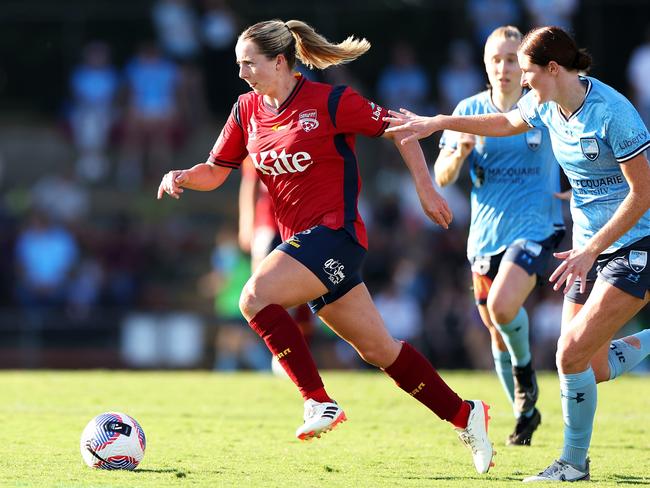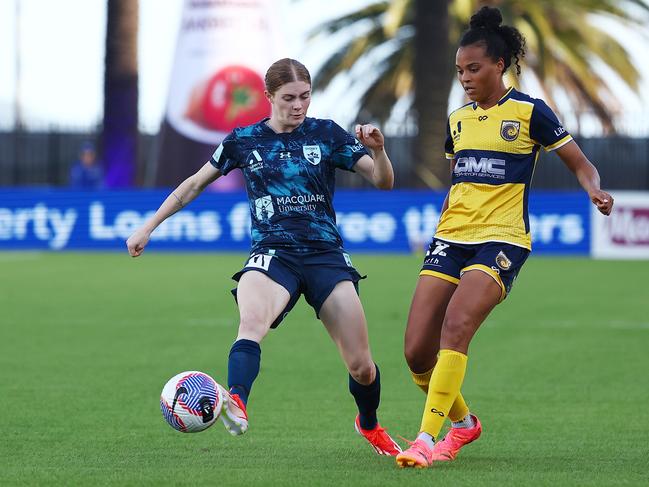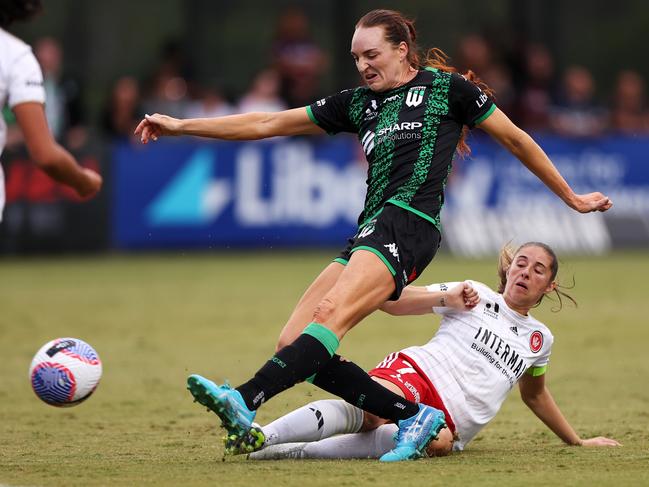Low wages, poor contracts: Why players are losing patience with A-Leagues and left the competition
A-League Women players are losing patience with the APL and switching leagues. An end-of-season survey shows just how bad the situation is, and a potential path to a brighter future.

Football
Don't miss out on the headlines from Football. Followed categories will be added to My News.
A-League Women players are losing patience with the APL and switching leagues due to the part-time nature of the top flight domestic competition.
Players have been vocal this past 12 months about the negative impact the low wage and 35-week contracts has on their mental health and financial stability.
In the end of season survey conducted by Professional Footballers Australia players self-reported satisfaction with their “life-balance” was at a record low.
Players’ top priorities for the league’s future were higher salaries (84 per cent) and 12-month contracts (81 per cent).
Currently A-League's’ women’s players are on 35 week contracts – with the majority of the players forced to find part-time work and join NPL clubs to keep up their fitness during the lengthy off-season.
Adelaide United veteran Dylan Homles, who has played in the league since 2014 is currently juggling four different jobs during the off season in order to pay the bills and playing in the NPL.
“Personally I really struggle coming off contract and going into the winter,” Holmes said.
“Having to find my way through that four or five months where I’m not contracted and having to do a lot of extra training on my own, working other jobs to get through the period, it’s tough.
“The mental health part of it is huge.”
The PFA and players are calling for full-time contracts to be introduced for the 2026/27 season.

PFA Co-Chief Executive Kathryn Gill said it was a “pressing need”.
“Creating an environment that adequately allows players to commit to the sport will ease the current financial and wellbeing burden on the players and allow the League and clubs to attract and retain talent in this incredibly competitive domestic and international market, ultimately enhancing the league’s quality,” Gill said.
“Switching to 12-month contracts and full-time pay will require a change in mindset from the Leagues and the Clubs to view this as an investment instead of a cost.
“The success of the Matildas and the professionalisation of leagues in the US and England showcase the benefits of such proactive investments, which are now experiencing exponential growth.
“Understandably players’ patience is wearing thin. Failing to recognise the significance of this moment and standing still isn’t an option that the players or the fans will accept.”
The APL says it supports the move to full-time contracts but is yet to put a time frame on it.
A-League's Commissioner Nick Garcia spoke at the Women’s Football Summit earlier this month.

“We desperately want to get to 12-month player contracts,” Garcia said at the event.
“That’s important for the league and to have full professionalisation. It’s important that we double down and think long-term as well, how can we lean on government funding, whether that’s through supporting the game, pathways or whether it’s through infrastructure to create best quality standards.”
The League experienced massive growth this season on the back of the hugely successful 2023 FIFA Women’s World Cup.
Holmes said with women’s football expanding around the world and new leagues popping up the A-League's had to lift if it wanted to keep up.
“When I explain it to people I say that we are part-time but with a full-time expectation,” Holmes said.
“The commitment that we need to have to our A-League teams in the priority and I think for a lot of us that is 100 per cent the case but it is challenging.
“You are seeing players in their mid to late 20s walking away from playing professionally because it’s just not sustainable for them to do it financially anymore.
“The balance is tough, it is having a huge impact.”
Just this off-season Matildas’ World Cup hero Cortnee Vine has announced she is making the move from Sydney FC to NWSL side North Carolina Courage alongside teammate Charlotte McLean.
Another four players Cannon Clough (Canberra United), Grace Wisnewski (Wellington Phoenix), Izzy Nino (Newcastle) and Hannah Keane (Western United) have revealed they are heading to the new US competition – the US Super League.
The new league, to start in August, will feature eight clubs in its inaugural season with plans to expand to 20 by 2026.

Both competitions offer 12 months contracts and the minimum wage is reportedly $52,000 (AUS).
More than double the minimum $25,750 wage for A-League’ women’s players are paid for their 35 weeks.
The PFA survey found that two-thirds of respondents said $60,000 a year would enable them to put 100 per cent focus into their football career.
Holmes said money wasn’t the driving force behind players switching leagues- it was a need for stability.
“Historically in women’s football we haven’t really been paid all that much,” Holmes said.
“So I don’t think we’re at the point yet where people are making big moves purely to chase money, I think they’re just making moves for footballing reasons and to be able to have the security of being employed for a full year.”
It was what drove Holmes to move to Sweden in 2021.
“I was on a 12-month contract – we are full time and the ability to play football full time and give your all to what you’re doing and not have to worry about a second job or anything like that was incredible,” Holmes said.
“I would love to see the A-League get to that point because I feel like the football will go to another level once we’re at full time.
“(The salary) was pretty comparable (in Sweden). The main difference was you got a proper off-season and pre-season – it is very different to here where we are only contracted for 35 weeks and then have to just wait for the next contract cycle to start again.”
Holmes said positive steps had been made – like the introduction of a 22-round full home and away season.
“If you look at the league five years ago to where it is now, it’s going in the right direction,” Holmes said.
“But the sentiment among the players is that having seen what the Women’s World Cup has done and the numbers that those games have generated that we want to be ambitious in this period, we want to really cement the league as one of the best leagues in the world.
“This is the time to make big steps, that is what we are pushing for.”
More Coverage
Originally published as Low wages, poor contracts: Why players are losing patience with A-Leagues and left the competition





